If you're a proud German Shepherd owner, you know just how much care and attention these lovable dogs need. From their high energy to their strong personalities, GSDs thrive when they’re healthy and happy. That’s why many dog owners today are asking the same question: what herbs are good for dogs?
Herbs have been used for centuries to support wellness in people, but did you know that some herbs can also be helpful for dogs? Certain herbs provide natural benefits like calming nerves, boosting the immune system, and helping with digestion. And yes, many of these herbs are safe for dogs including your German Shepherd when used the right way!
In this ultimate guide, we’ll walk you through everything you need to know about herbs good for dogs, especially larger breeds like GSDs. You'll learn which herbs are safe for dogs, how to use them, and which ones to avoid. No confusion, no guesswork just solid, thoughtful advice tailored for your German Shepherd’s unique needs.
Whether you’re looking for a natural way to ease your pup’s anxiety or boost their overall health, the right herbs could make a big difference. Let’s dive in and explore this exciting, all-natural way to care for your furry friend!
Why Choose Herbs for Your Dog’s Health?
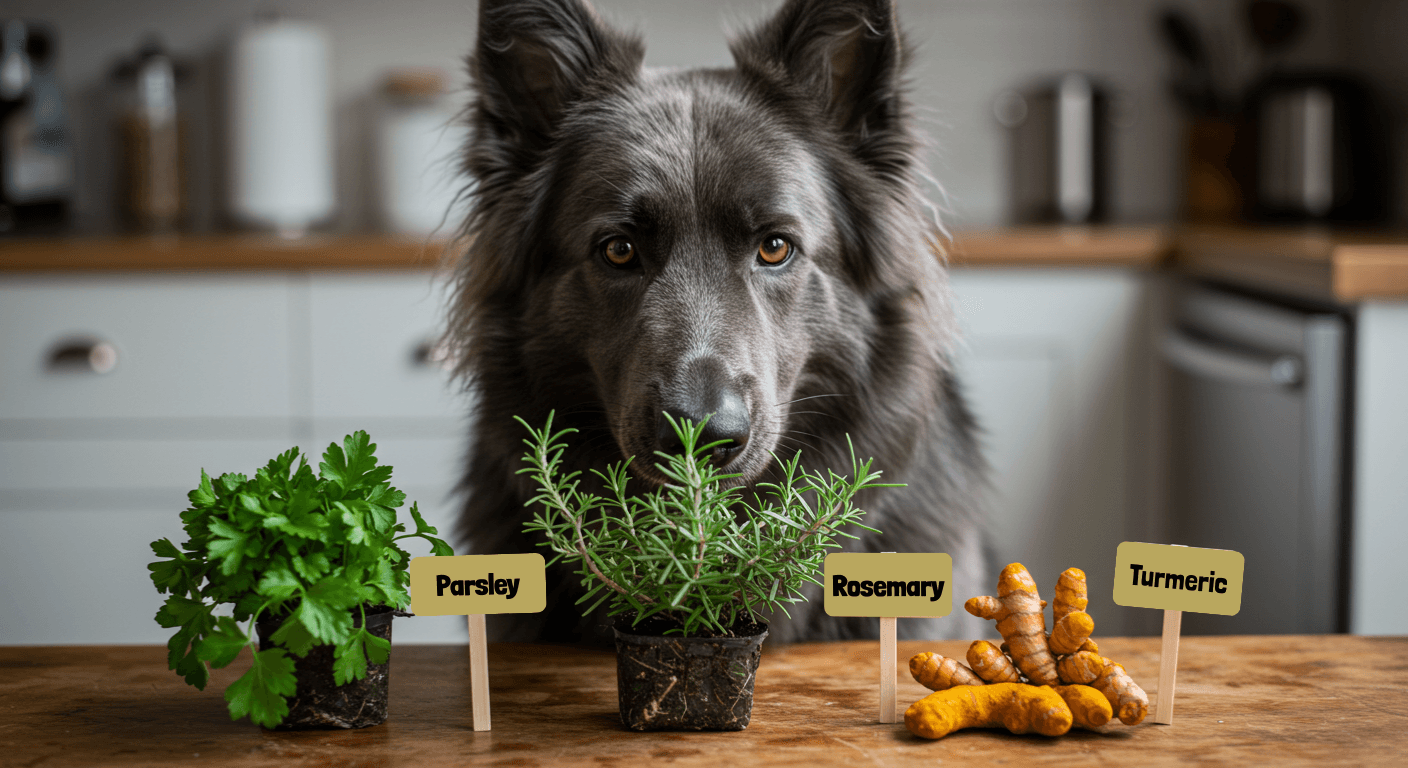
When it comes to our German Shepherds, we want to give them the best care possible right down to the food they eat. That’s where using herbs for dogs comes in. These natural ingredients aren’t just great for flavor, they can also support your dog’s health in surprising ways.
Many herbs good for dogs offer benefits like boosting the immune system, easing digestion, and calming anxiety. Just like we add cinnamon to soothe a stomach or parsley to freshen breath, certain herbs are safe and healthy additions to your German Shepherd’s meals.
Natural choices often feel safer than medications, and for good reason. Herbs are often packed with vitamins, minerals, and antioxidants. They can help your GSD feel better without added chemicals or harsh ingredients. Plus, using dog food seasoning made with safe herbs means your pet’s meals don't just taste better they support their body too.
Choosing spices good for dogs also helps avoid common allergens found in artificial flavorings. Since German Shepherds are known for having sensitive stomachs, natural herbs can be a gentle way to add health-boosting flavor.
Adding herbs to your dog’s diet doesn’t mean you need to go overboard. Starting small with safe, vet-approved options is key. In the next sections, we’ll explore exactly what herbs are good for dogs, how to serve them, and which ones you should avoid.
15 Best Herbs for Dogs
Vet-Approved Herbs: Safe Choices for Your Pup
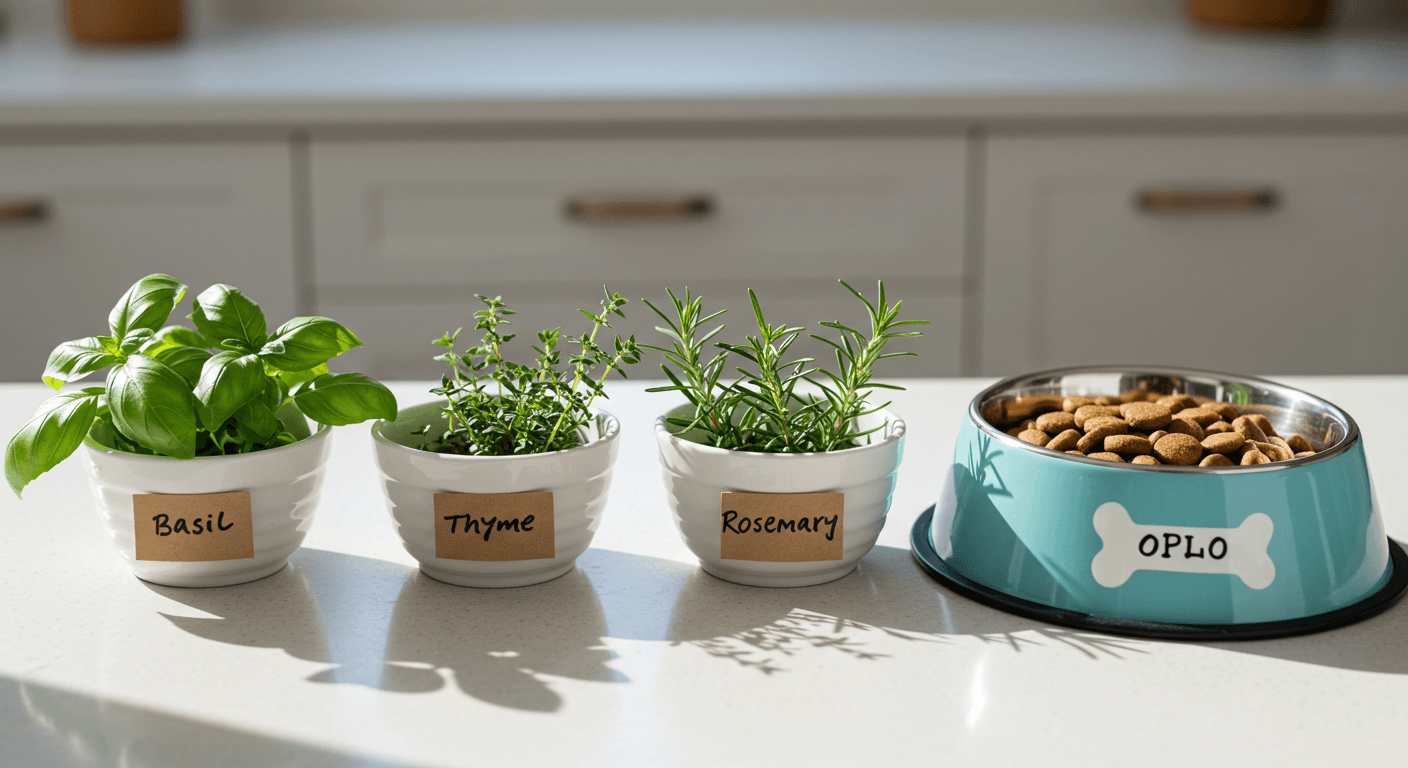
When it comes to caring for your German Shepherd, knowing which herbs are safe for dogs is just as important as choosing the right kibble or toys. Herbs can be a healthy and tasty addition to your GSD’s diet but not all are created equal. That's why we've rounded up vet-approved herbs that are not only safe but also beneficial to your pup’s health.
German Shepherds are known for their strong builds and active lifestyles, so they can really benefit from natural herbs that support digestion, joint health, and immunity. Below you'll find a list of commonly asked questions like "is basil toxic to dogs?" or "can dogs eat thyme?" and the truth about these popular herbs.
- Basil for Dogs – Fresh basil is not only safe for dogs, it’s actually really good for them. It has anti-inflammatory and calming effects. So if you're wondering, "Is basil ok for dogs?" the answer is yes!
- Thyme – Yes, dogs can eat thyme in small amounts. It helps with digestion and has antibacterial benefits. Just be sure to avoid the oil form, which can be too strong.
- Rosemary – This herb smells great and supports your dog’s memory and heart health. To answer a frequent worry: no, rosemary is not toxic to dogs when used correctly.
- Sage – Can dogs have sage? Absolutely but in moderation. It's safe when sprinkled over food and is known to support brain function and ease upset tummies.
Before adding any herb to your German Shepherd’s bowl, it’s best to chop it up finely and sprinkle small amounts over their food. Start slow and see how your dog reacts. If you’re ever unsure about a specific herb like 'is basil bad for dogs?', it’s wise to check in with your vet first.
Remember, the key to using herbs safely is keeping portions small and sticking to those known to be dog-friendly. None of the options here are just treats they offer real health benefits too.
Spices and Seasonings: What’s Safe and What’s Not?
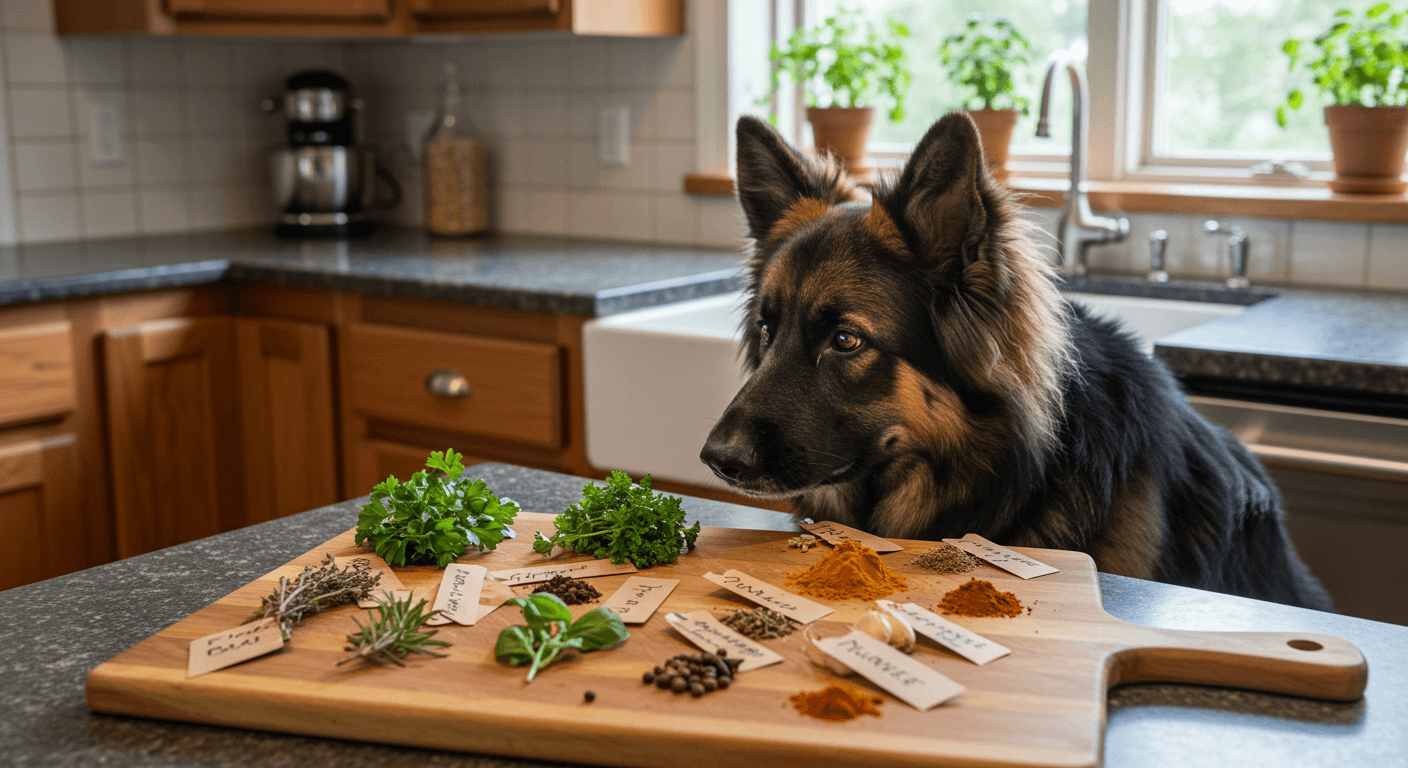
We all love to share our favorite meals with our dogs, especially when they give us those big, hopeful eyes. But when it comes to spices and seasonings, it gets tricky. German Shepherds are strong and active, but their stomachs can still be sensitive. So, understanding what spices are good for dogs and which ones to avoid can help keep your pup safe, happy, and healthy.
Many common kitchen spices can be safe, or even helpful, for dogs in small amounts. Others, though, can cause upset stomachs or worse. Let’s break down what's okay and what’s not.
Safe Spices for Dogs:
- Turmeric – This yellow spice is known for its anti-inflammatory benefits. A tiny sprinkle can help with stiff joints, especially in older GSDs.
- Ginger – Great for digestion and nausea. Just a pinch goes a long way.
- Cinnamon – In very small amounts, cinnamon can help regulate blood sugar.
- Parsley – Freshens breath and contains vitamins. Just avoid the spring parsley kind it can be toxic.
Spices to Avoid:
- Salt and Pepper – Too much salt can lead to dehydration. And pepper, especially black pepper, may upset a dog’s stomach.
- Paprika – It’s not toxic, but it can irritate your dog’s eyes and throat. Best to avoid it.
- Cloves – These can damage a dog’s liver and cause nervous system issues.
- Oregano – Some dog owners ask, "Can dogs have oregano?" A small pinch might not hurt, but too much can upset their stomach. It's best to skip it.
- Rosemary & Cilantro – These herbs might be okay in very small doses, but large amounts can cause problems like seizures or stomach trouble. If you're unsure, avoid them or talk to your vet.
Next time you’re cooking, it’s good to ask yourself before sharing: 'Is this spice safe for my German Shepherd?' Always use plain, dog-safe ingredients and skip the ones that cause harm. It's a small step that keeps your pup safe and tail-wagging!
How to Safely Add Herbs to Your Dog's Diet
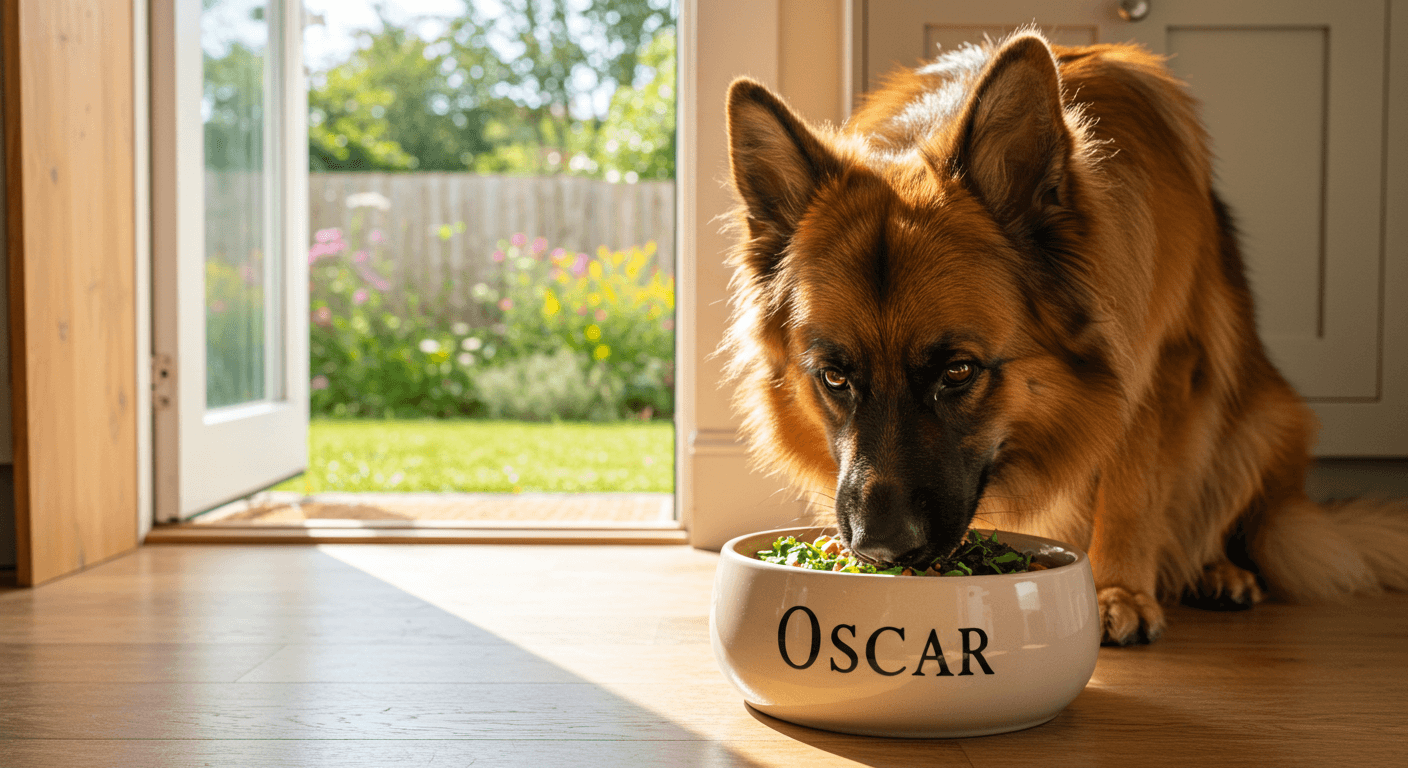
Adding herbs to your German Shepherd’s meals can be a healthy way to boost nutrition, improve digestion, and even freshen their breath. But before sprinkling anything into their food bowl, it’s important to know how to do it safely. Let’s walk through the right way to introduce herbs good for dogs, so your GSD stays happy and healthy.
Start small. When offering safe herbs for dogs, always begin with a tiny amount. Even the best herbs for dogs can upset a stomach if introduced too quickly. Try a pinch of parsley or a sliver of basil, then watch your dog’s reaction over the next 24 hours. No signs of discomfort? You’re probably good to go.
Fresh is often best. Dried herbs may seem convenient, but fresh ones hold more benefits. For example, fresh rosemary or thyme adds flavor and antioxidants making them great as dog food seasoning. Just wash the herbs first and chop them finely to make them easy to digest.
Avoid using herbs meant for people if they contain added oils, garlic, onion, or salt. These are not healthy spices for dogs, and some can be downright dangerous. Always give your GSD plain herbs without extras.
- Parsley – Helps freshen breath and supports kidney health.
- Basil – Rich in antioxidants and can ease anxiety.
- Rosemary – Supports heart and digestion when used in small amounts.
- Thyme – Has anti-fungal and antibacterial properties.
- Ginger – Aids in digestion and can relieve nausea.
Ready to add herbs good for dogs to your German Shepherd’s dish? Mix them in with their regular food or sprinkle on top as a natural dog food seasoning. Keep it simple and stay consistent for the best results.
When to Avoid Herbs: Risks and Toxicities
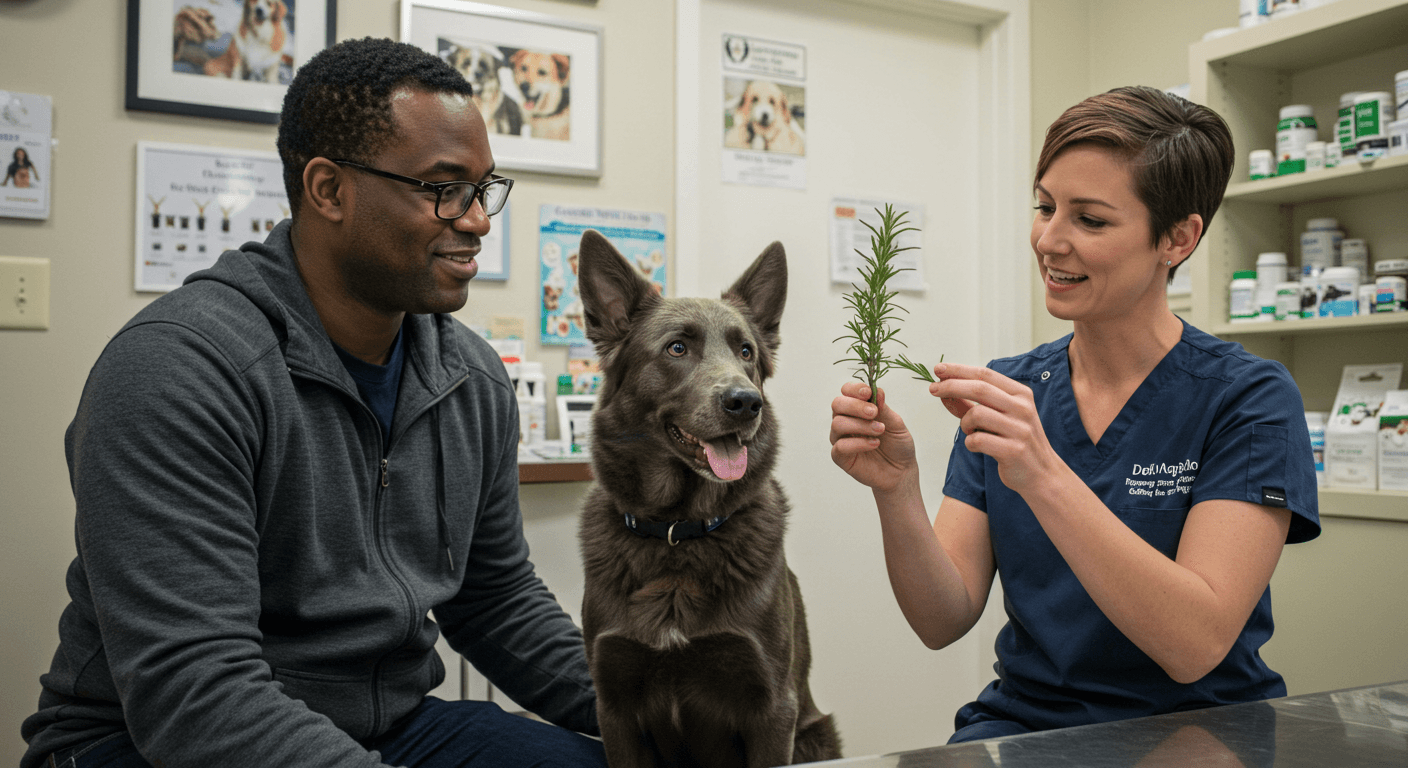
Herbs can be healthy and tasty additions to your German Shepherd’s diet. But not all herbs are safe for dogs. Knowing when to avoid herbs is just as important as knowing which ones are okay. Feeding your dog the wrong herb can cause upset stomach, weakness, or even more serious problems.
For German Shepherd parents, it’s easy to assume that if an herb is good for people, it must be good for dogs too. Unfortunately, that’s not always the case. Dogs digest things differently, and even small amounts of certain herbs can be harmful.
- Is rosemary toxic to dogs? While small amounts of rosemary are often found in dog foods, large amounts can cause stomach issues or even seizures in sensitive pets.
- Is oregano OK for dogs? Plain oregano in small doses might not hurt, but too much can irritate your dog’s stomach or liver. Never use oregano essential oil it’s far too strong and can be toxic.
- Is basil toxic to dogs? Luckily, basil is one of the herbs safe for dogs when used in moderation. It can even help with inflammation or stress.
Always introduce new herbs little by little, and keep an eye out for allergies or signs of sickness. If your German Shepherd shows unusual behavior like vomiting, drooling, or weakness, stop the herb immediately and call your vet.
Herbs safe for dogs can be a great way to boost health, but risky herbs can do the opposite. If you’re ever unsure, ask your vet before adding a new herb to your dog’s meals. Your German Shepherd’s safety should always come first.
As we wrap up this guide on what herbs are good for dogs, it's clear that nature offers many helpful options to support your German Shepherd’s health. Whether you're looking to ease anxiety, support digestion, or boost the immune system, there are several herbs safe for dogs that can make a real difference.
The key takeaway? Always choose herbs that are dog-friendly and check with your vet before trying something new. While many of the best herbs for dogs like chamomile, parsley, and turmeric offer great benefits, not every natural remedy is safe for your pup.
Every German Shepherd is unique. Some dogs may respond better to certain herbs than others. It's important to start with small amounts and watch how your dog reacts. And remember, herbs work best when they support an already healthy lifestyle that includes good food, regular exercise, and lots of love!
So the next time you're wondering what herbs are good for dogs, you'll know you're not just adding flavor you’re helping your GSD live a longer, happier life. Use this guide as a safe starting point to explore the world of herbal health for dogs. With the right knowledge, you can feel confident in making natural choices for your four-legged friend.



